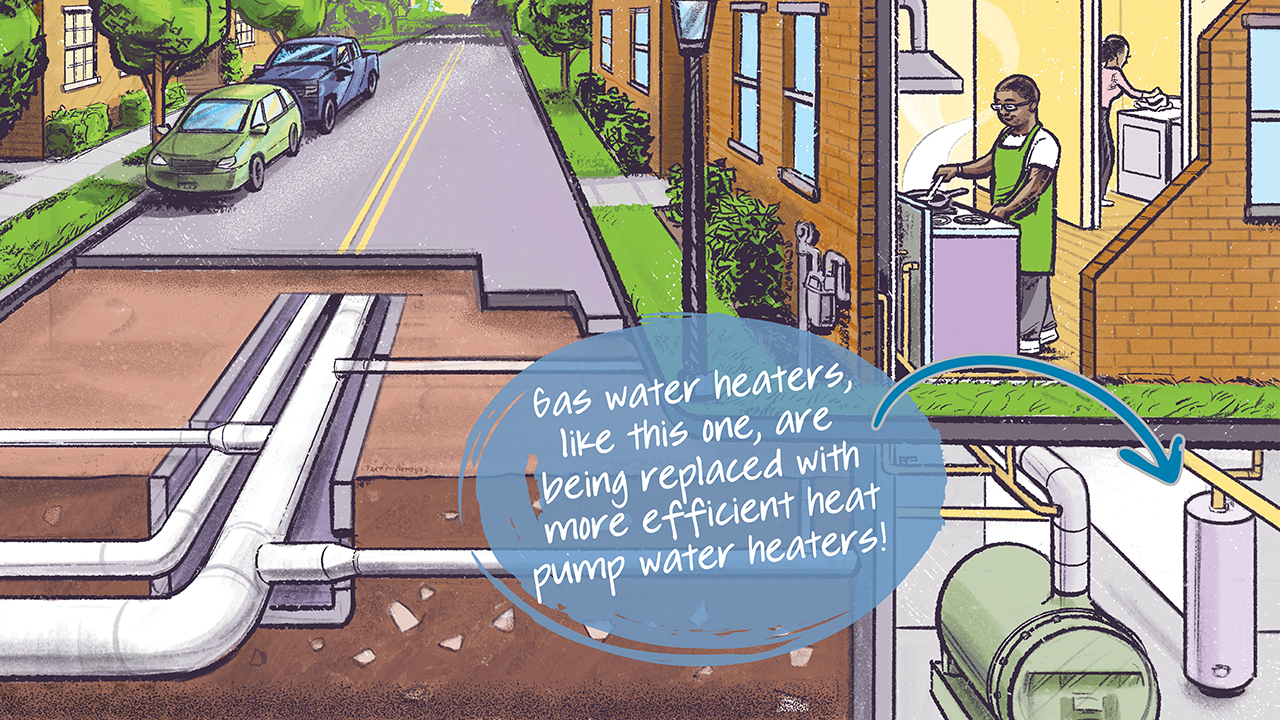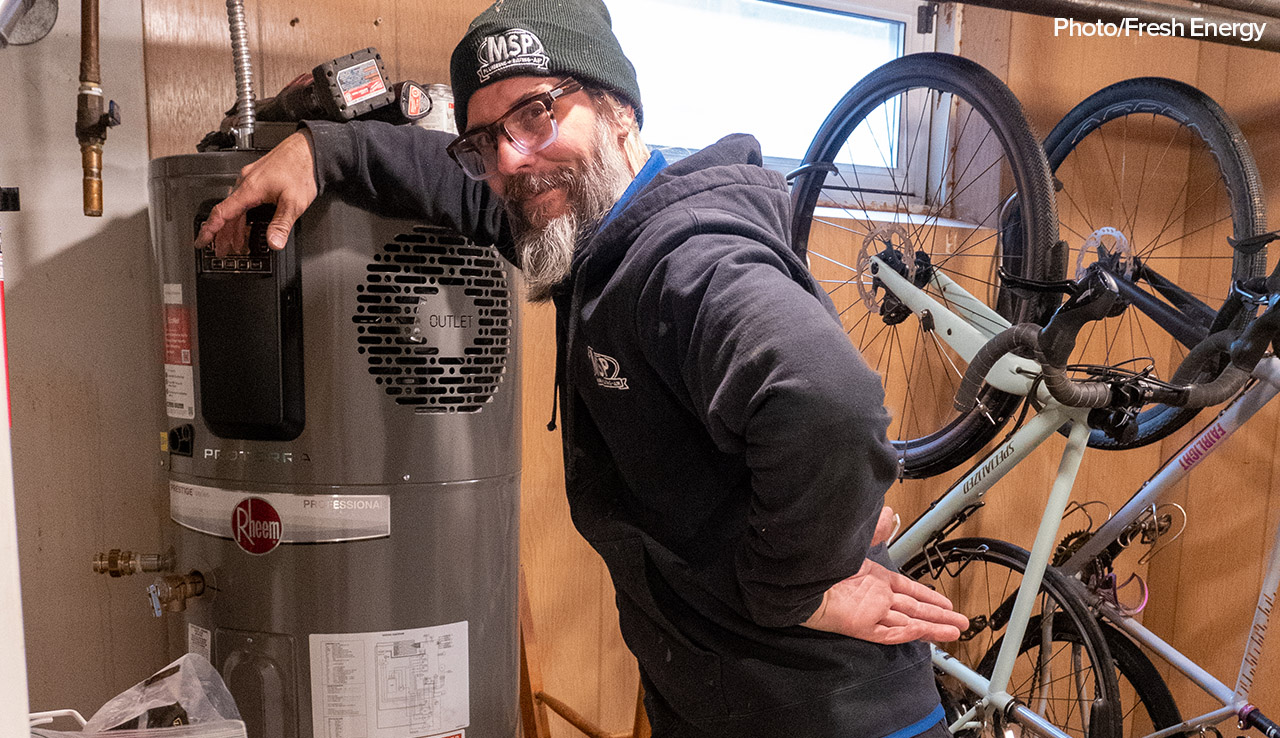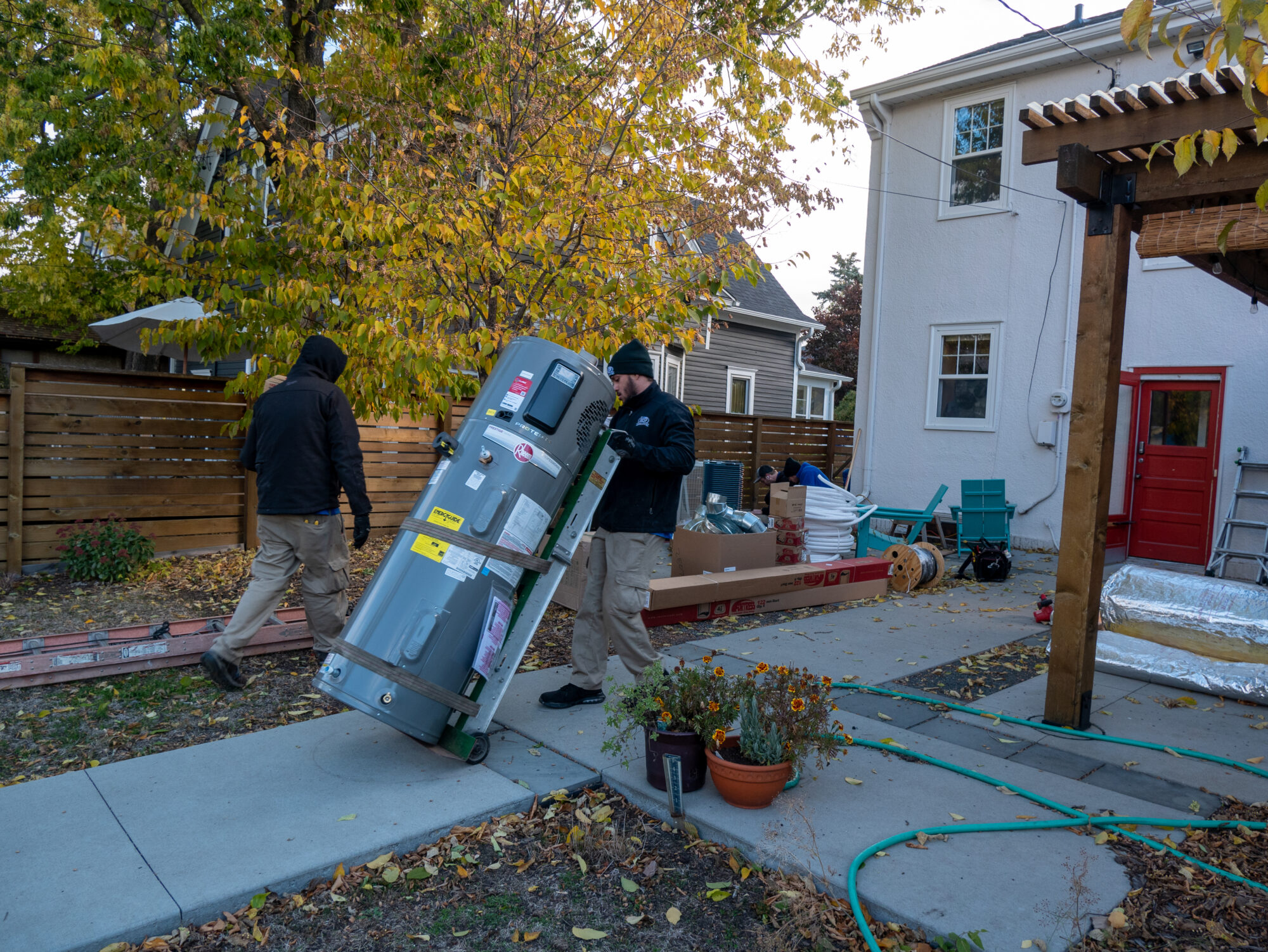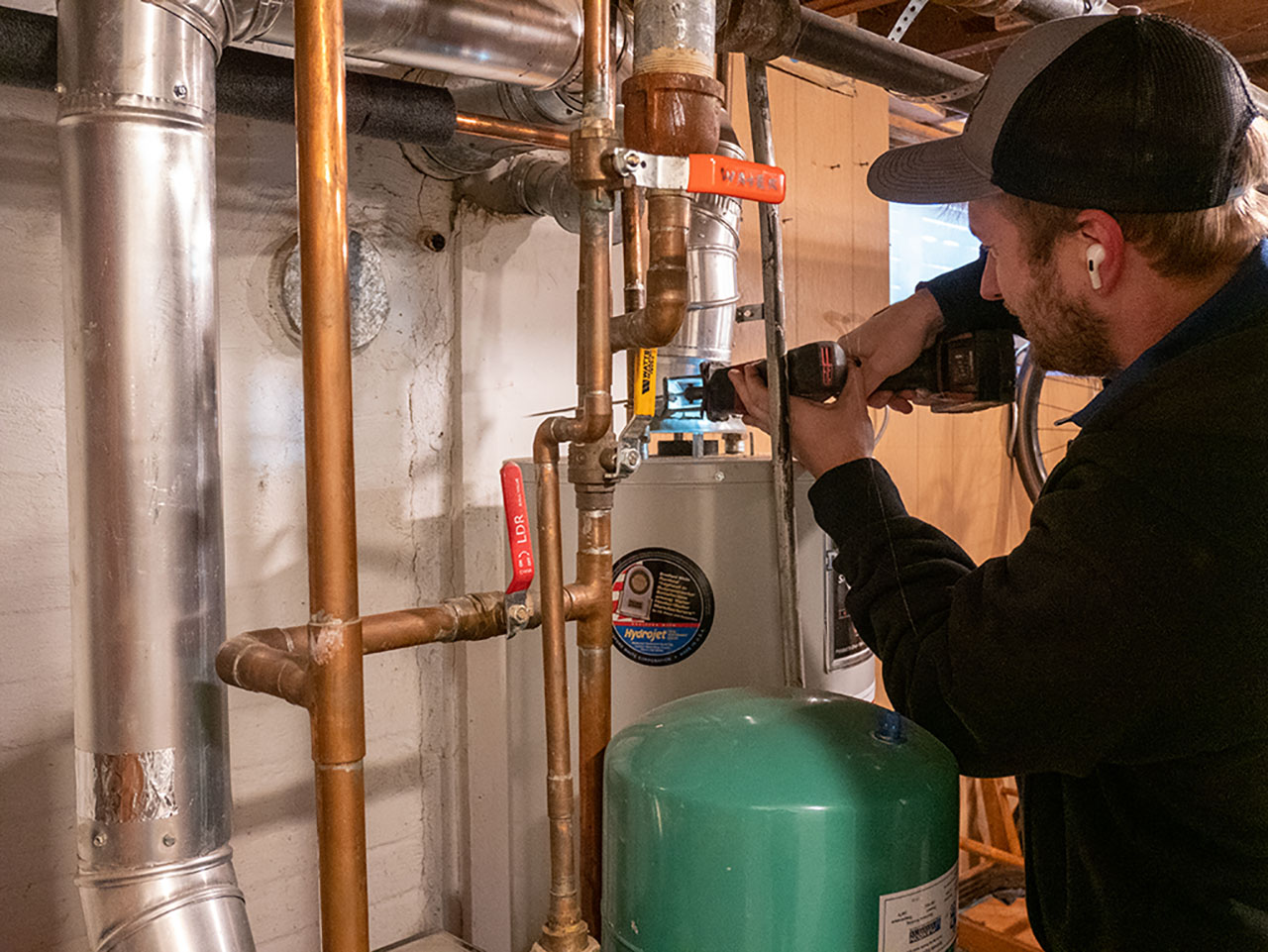
Tucked into the basements or closets of our homes, water heaters silently work to ensure our buildings have hot water at a moment’s notice for our laundry, dishwashers, showers, and faucets. And while most people only think about water heaters when they break down and require service, our energy experts at Fresh Energy think of them every day—and how they’ve transformed from an energy hog to a clean, efficient appliance with serious benefits for human health and the planet.
Heat pump water heaters (HPWHs, also called hybrid water heaters) are a newer technology that use electricity to move heat in the ambient air to heat water in its tank, making for a super-efficient, decarbonized method of delivering hot water in buildings across the country.
But how do they compare to other water heating technologies, and what does this mean for our climate and neighborhoods in Minnesota? Keep reading to find out.
How do heat pump water heaters work? How are they different than electric or gas-fired water heaters?
A heat pump water heater is a super-efficient, low-carbon way to heat water in your home or building. It has a water tank with a heat pump attached to the top that is powered by electricity to transfer heat from the surrounding air into the tank to heat the water. This is similar to how a refrigerator works, but in reverse: instead of pulling heat out of the refrigerator into the air, a heat pump water heater pulls heat out of the air to heat the tank. This means heat pump water heaters dehumidify the air and also lower the temperature of the room by a few degrees—which can be a benefit in summer months but something to consider in the winter months.
Traditional electric water heaters use electricity to generate heat in coils inside the tank, similar to how a space heater uses electricity to generate heat to warm the air. While this still has the advantage of running on electricity instead of burning gas for heat, it is less efficient than a heat pump water heater, and thus will use more electricity, too.
Gas-fired water heaters burn a fossil fuel like natural gas (also called methane) or propane to heat the water. These emit greenhouse gases and toxins like nitrogen oxides that have negative effects on human health and the climate. While gas-fired tankless water heaters were once considered an energy-efficient alternative to traditional water heaters, a recent study by Stanford researchers has shown that tankless heaters emit twice as much unburnt methane into the home, since the gas is ignited every single time hot water is used in the home no matter the length of time. If you’re looking for a water heater that’s efficient and won’t leak harmful pollutants into your home, heat pump water heaters are the way to go.
Your Energy Matters.
Clean energy is a critical climate solution!
From inspiring stories to actionable insights and practical tips, get everything you need to make an impact in our monthly e-newsletter.
Sign Up Today
What are the benefits of a heat pump water heater?
Water heating accounts for up to 32 percent of energy used in single and multifamily homes, making it the second-highest energy hog in buildings after heating and cooling units.
Heat pump water heaters are much more efficient than traditional gas-fired water heaters. Since heat pump water heaters capture heat from the surrounding air to heat water in the tank, they’re up to two to three times more efficient than these traditional systems, sometimes reaching efficiencies as high as 300 or 400 percent. Gas and standard electric water heaters top out as low as 90 percent efficient but can even be as low as 60 percent. A higher efficiency means a lower cost of ownership over time, even if the initial purchase and installation is incrementally higher. Be sure to check if you qualify for incentives if you are considering installing a heat pump water heater—there are federal tax credits available that could save you up to $2,000.

Water heaters are much easier to install than the home’s biggest energy consumer, the HVAC system. There are no required insulation or major building science upgrades to make when replacing a traditional gas-fired water heater with a heat pump water heater. However, if you’re considering switching to a heat pump water heater, there are two main planning pieces to consider: you may need to upgrade the electrical socket from 120 volts to 240 volts, which is the size many washers and dryers use. However, there are some 120-volt options available on the market. The other thing to consider is square footage: because the heat pump will pull warm ambient air into the tank, it will need sufficient open-air access to run properly—roughly an eight by eight-foot room minimum.
Additionally, the tank in heat pump water heaters is also a benefit to homeowners. Since tankless water heaters don’t work without electricity, they won’t be able to deliver hot water if you lose power like a heat pump water heater tank can. Plus, if you’ve joined your electric utility’s demand-response program, you might be able to access lower-cost, cleaner electricity to heat your water, too.
Are heat pump water heaters better for the climate and human health?
Heat pump water heaters are also better for our climate: since they can run on clean energy instead of greenhouse gas-emitting fossil fuels, they reduce up to 1 ton of carbon dioxide (CO2) per year, about the same as installing six solar panels.
Heat pump water heaters and standard electric water heaters are also better for indoor air quality. Since there’s no combustion happening in heat pump water heaters, there are no harmful pollutants like nitrogen oxides being released into your home or building.

You probably wouldn’t run your internal-combustion car in a closed garage, but we’ve become very desensitized to burning natural gas in our homes for heating, hot water, and cooking. Research has shown that 12.7 percent of current childhood asthma in the U.S. is attributable to gas stove use in the home, which is similar to the childhood asthma burden attributed to secondhand smoke exposure. That’s a serious risk—and eliminating gas appliances in the home, from gas stoves to gas water heaters and gas furnaces, can improve indoor air quality.
Do heat pump water heaters work in the cold?
Since heat pump water heaters use the ambient warm air in your home to heat water, they’re reliable and effective to use all year long. While Minnesotans should ensure they install a proper heat pump HVAC system to warm their house during cold winters, cold weather isn’t really a factor for heat pump water heaters since they use heat from inside, not outside, your home.
In fact, more people than ever before are switching to heat pump water heaters thanks to their lower cost to operate, increasing efficiency standards, and up-front incentives helping people make the switch. In the Midwest, we’ve gone from about 66 percent of homes with a gas water heater to about 60 percent, while use of electric and heat pump water heaters has grown from 29 percent to 36 percent of homes. Adoption has begun to reach a tipping point as more folks learn the benefits of heat pump water heaters and can take advantage of financial incentives to help them transition.
What’s next?
As Fresh Energy works to build a resilient, clean energy future for Minnesotans and beyond, we’re working on new policies to lower emissions in the buildings sector. While Minnesota’s electricity and transportation sectors are getting cleaner every year, pollution from buildings is increasing every year, and we’re working hard to reverse that trend.
Fresh Energy’s Buildings department is working on building energy performance, building electrification, and gas system decarbonization. In our broader work, the Buildings department resides within our energy transition imperative, which also includes clean transportation and industrial work. Stay tuned as we strive to pass policies and participate in regulatory processes to ensure our buildings sector aligns with Minnesota’s decarbonization targets!
